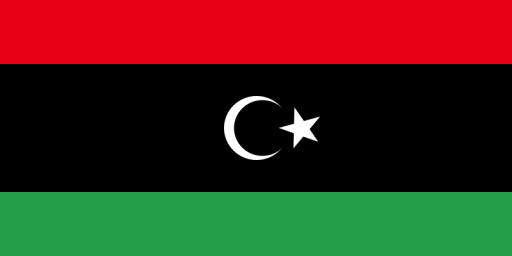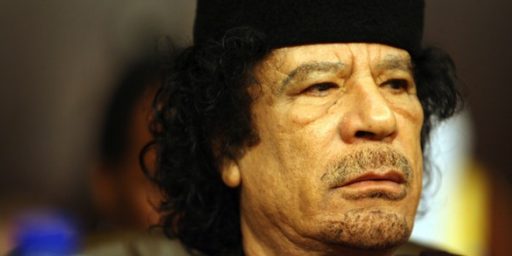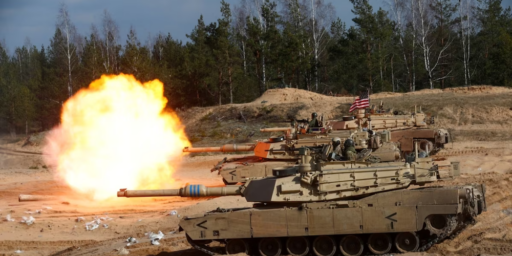Libya Exit Strategy
Tom Ricks doesn't understand why we need an exit strategy in Libya.
Thomas Ricks has been covering military affairs for major publications since I was a high school sophomore and is one of the best. His two books on the Iraq War, particularly Fiasco, are must-reads for students of modern war, as is his Best Defense blog at Foreign Policy‘s website.
So I’m very distressed to see him repeatedly fail to understand an elementary concept on war planning, the requirement for an exit strategy.
He threw this in as an aside in a Monday posting:
I grow weary of talk of an “exit strategy.” It is a canard and a false concept. Can anyone remember the last time there actually was an exit strategy going in that actually worked? Military actions aren’t interstates.
He compounds the error today, making a bizarre analogy between war and divorce and concluding, “There is a basic contradiction here between these officers’ insistence on clarity and the ambiguous and uncertain nature of warfare.”
It’s a fundamental precept of national security policy going back to at least the writings of Carl von Clausewitz that wars are fought to achieve political ends and it follows that military strategy must be tailored to achieve political ends. Indeed, countries can lose wars in which their armies are absolutely dominant on the field of battle–as American forces were in Vietnam–if the fighting does not achieve the sought political objectives.
In order for military planners to match tactics and strategy, they must know what the end game is. In the case of total war, such as we fought in World War II, that’s pretty simple: The unconditional surrender of the enemy. In the case of humanitarian interventions, counterinsurgencies, and stability operations, however, it’s much harder.
The concept of an exit strategy is designed to spotlight this dilemma. Simply put: How do we know when we’ve won the damn thing and can stop fighting?
In the case of the ongoing “kinetic operations” in Libya, UN Security Council Resolution 1973 is the authorizing document. After the requisite listing of whereofs and therefores, it outlines the crux of the mission as “protect civilians and civilian populated areas under threat of attack in the Libyan Arab Jamahiriya, including Benghazi, while excluding a foreign occupation force of any form on any part of Libyan territory.”
That sounds simple enough, right? It would seem to pointedly preclude a long nation-building exercise such as those undertaken in Iraq and Afghanistan or even a drawn-out peacekeeping mission such as we saw in the former Yugoslavia.
Other provisions of the Resolution call for a no-fly zone, which has been rendered moot by the near annihilation of Libya’s air force. And coalition forces have destroyed tanks moving in on population centers. Presumably, Gaddafi will run out of tanks, too, if he keeps it up.
But what exactly constitutes a “threat of attack”? Is this an indefinite exercise? The most obvious way to achieve it is the overthrow of the Gaddafi government–or, to use modern parlance, “regime change.” But the Obama administration is very adamant that this is not the goal. And, if it is, I’m more than a little skeptical that we’ll be willing to simply let things work themselves out instead of staying around to help establish a follow-on government.
Also, since this is a civil war with rebel forces actively seeking to topple Gaddafi, it’s not at all inconceivable that anti-Gaddafi forces will also pose a threat to civilians at some point. Will we go after them, too? The Resolution would seem to demand it. We had mixed experience with that in Kosovo, incidentally.
The bottom line is that the colonels Ricks is hearing complaining about the lack of an exit strategy aren’t asking for all the answers, just the most important one: What are they fighting for?







I think to some extent you and Ricks are talking past each other. My guess is he’s reacting to the more facile calls for “exit strategy” as if there was going to be a plan for a date and time complete with an Expedia itinerary.
I think we have a goal we can’t openly acknowledge for reasons of diplomacy: regime change. So I guess the exit strategy involves some ambitious Libyan Colonel shooting Gaddafi or arranging for him to be taken by the opposition, or maybe just putting him on a plane with a one-way ticket to Venezuela.
I don’t have any insight on whether that’s going to happen. But that’s what we want to see and hope to see. Do we keep going until that happens? The answer is: it depends. I’ve said from the start I can see this thing going wrong about nine different ways. We rolled the dice and they haven’t stopped yet.
I fail to to understand your objection to Ricks’ position on an “exit strategy”. It should be clear to us all that any strategy articulated wouldn’t be worth the paper it was written on, as it would be discarded the moment our political and military leaders find it inconvenient.
@michael reynolds: I can live with having political objectives that can’t be openly articulated, although that’s a little rough in a putative democracy. But the objective nonetheless has to be communicated to military planners.
@Ben Wolf There’s always room for some fluidity. Goals can be changed. But you still have to have an end game in mind at the outset, in order to know what it you’re trying to do.
Depending on the level of officer, I agree. I don’t think a captain needs to know. But at the strategic planning level, sure.
James,
The problem is that after the last decade of directionless war, ever-shifting strategies and eternally receding withdrawal timelines, would you or anyone else take any exit strategy seriously? I wouldn’t, because the executive can discard it on a whim.
Without Congress fulfilling its oversight responsibility through legislation there is no pressure for the execucutive to hold true to his word. That’s how we ended up with what is for all purposes a permanent occupation of Afghanistan.
The president won’t be true to his stated goals because he doesn’t have to.
“Could you clearly state for me, sir, the commander-in-chief’s intent?”
–source
When you are ready to leave, you just leave. That’s the way it has always worked, and I think a few commentators are insightful enough to highlight that.
Now, there are some interesting parallels in brain research. The belief there is that we make fewer conscious decisions than we think we do, but are just very good at making up rational-sounding reasons after. “Why did you pick up the red block?” “It reminded me of an apple.” Never mind that you were actually tricked and handed the block, or whatever.
You know, I can see more than a little of this parallel in the (lack of) Afghanistan withdrawal. The nation hasn’t really gathered itself to do the move … but when it does, it will talk some blarney about why that is the right time….
I expect that if Libya just doesn’t “work,” we’ll find a way to unwind ourselves. Heck, it’s a Canadian problem, right?
Actually, although it apparently took Sec. Rumsfeld until 2005 to say it, the Weekly Standard discussed it as early as 2003: you want a victory strategy, not an “exit strategy.”
I’m as Clausewitzian as the next guy (perhaps more), and agree with Mr. Joyner about that. It’s the notion of an exit strategy versus one for victory or even a set of objectives or goals, an end state that is worth all the trouble, blood, and treasure that vexes me.
Language is important. The very use of the word “exit” together with “strategy” messages our essential unseriousness about the dead serious business of warfare, and causes our allies many sleepless nights. It signals that our most important objective is to leave, to be uninvolved, even as we commit men and materiel to a conflict.
What is our strategic grand objective? From that all lesser operational and strategic issues must necessarily flow.
I’ve quoted you and linked to you here.
http://consul-at-arms2.blogspot.com/2011/03/re-libya-exit-strategy.html
@Consul-At-Arms: i don’t think we disagree here. “Exit strategy” isn’t a branding tool but a planning tool. It’s an easy way to think about political objectives, which can be fuzzy. Instead of saying “well, we want to protect civilians from slaughter,” we should be thinking “what state of affairs on the ground in Libya are we trying to achieve?” By looking at the desired end state, we can decide whether military force can achieve it and avoid mission creep.